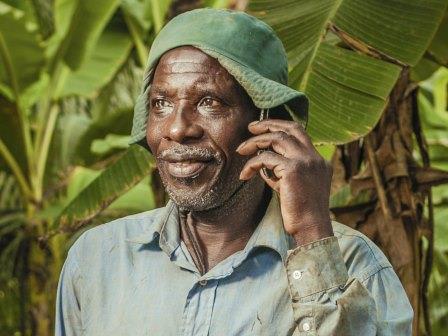
Smallholder farmers make up 60% of Ghana’s working population. They provide a large portion of the food consumed in the country, yet many struggle to make a good living. A major problem they face is accessing information about farming and about trends along other parts of the value chain, such as market prices.
So begs the question; how can a service be developed that allows farmers to access agronomy information? With the world going through extreme changes as mobile phones enter almost all fields of human activities, will mobile phones be their preferred way of getting information?
Through user research, Farmerline discovered that a mobile phone service will provide a smallholder farmer with an interpersonal relation level for fast, easy and flexible agricultural information sharing despite distance and extension service troubles. A finding that birthed an innovative mobile voice messaging platform from Farmerline that disseminates weather forecasts, market prices, agronomic tips and financial tips to more than 5,000 farmers in Ghana.
Available in nine (9) local languages, this service essentially digitises and enhance the work of extension agents.
“One of the largest challenges traditionally experienced by Ghana’s smallholder farmers has been a lack of transparent information especially with the challenges that extension officers go through.” Schandorf Adu Bright, Director of Farmer Services at Farmerline says.
“Which is why Farmerline’s mobile phone-based service is a great tool to use seeing as it addresses this problem by giving them access to market prices, enabling them to negotiate better deals with traders and improve the timing of getting their crops to market. We’re basically helping farmers in their decision-making and ensuring that appropriate knowledge is shared to obtain the best results.”
For Patrick Sakyi, Monitoring and Evaluation Associate at Farmerline, this mobile phone-based service from Farmerline is needed because the information provided is always relevant to a farmer’s specific situation.
In another respect, Farmerline hosts in-person 6-8 workshops in farming communities each week to answer questions about its technology, market conditions and distribution channels; and offer financial training.
“We believe this will help in the transformation of extension services into diverse and demand-driven value chain information. This explains why we have localized and customized the service to suit the local user,” Patrick says.
In May 2013, Farmerline also undertook 3-month piloting exercise with fish farmers on its content services. The pilot helped Farmerline to discover:
I. Preferred call schedules for farmers
II. Acceptable call duration of content for farmers
III. Mobile network challenges in rural areas, etc.
“At the end, the pilot helped Farmerline to build additional features for its mobile messaging such as call retry feature; which allows a user to be called back several times should they miss their call due to whatever reason. The call scheduler feature also allows account administrators to schedule calls ahead of time,” Schandorf says.
With the agricultural officers very scarce these days, there must be efforts to provide information, interaction, feedback and support through mobile phone and internet technologies. And Farmerline is leading the trail in this regard.
This news item is part of a Partner Spotlight on Farmerline (4-11 November). Each week, the GFAR Secretariat is turning the spotlight on the work and collective actions of Partners in GFAR who share in our mission to strengthen and transform agri-food research and innovation systems globally. For more information on the Partners in GFAR, and to become a Partner, click here!
